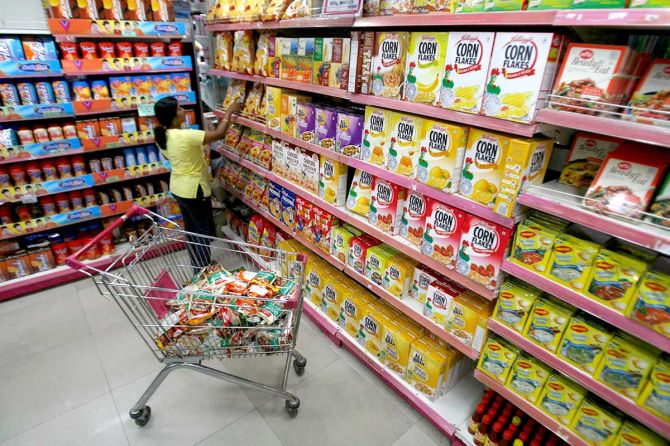Over the past year, Amul has undergone a transformative journey, evolving from a dairy-centric entity to a comprehensive foods company.

Since 2022, PepsiCo India, too, has embarked on extensive launches in the food category.
Not to be left behind, ITC, which has been introducing an average of 100 fast-moving consumer goods (FMCG) products across categories every year, has also launched a number of packaged food items.
The shelves in stores are packed. The options on e-commerce platforms are dizzyingly aplenty. The consumer is spoilt for choice.
Which flavour of oats to go for? What packet of chips to pick?
Should one reach out for those mouthwatering frozen snacks or think healthy and opt for atta (wheat flour) cookies?
Companies are pulling out all possible goodies in the form of packed food.
It is a strategic shift initiated during the pandemic and which has proven to be a lasting trend.
During the pandemic, when other businesses were curtailing expenses, food companies started launching new products as consumers turned to packaged food.
Amul identified a growing preference for purity during the pandemic, and realised that this preference was here to stay.
The company aggressively expanded its product range, venturing beyond dairy into items such as organic dal, atta, and basmati rice.
“We noticed that consumers were moving from unbranded to branded products, and were increasingly seeking out those that would boost their immunity,” says Jayen Mehta, managing director, Gujarat Cooperative Milk Marketing Federation.
Even later, as the world moved out of the pandemic, the preference for packaged foods continued.

Convenience foods, which had gained prominence during the pandemic, sustained their popularity.
The widespread adoption of modern retail formats, including brick-and-mortar, e-commerce and quick commerce, proved to be further growth enablers for packaged foods.
These formats facilitate the display of entire product ranges to a larger consumer base, says brand expert Devangshu Dutta, founder at Third Eyesight, and that helps.
Growing platter
Today, while Amul’s flagship product, packaged milk, is recording double-digit growth, Mehta says the company is also focusing on premiumisation by introducing artisanal cheese and products such as Amul High Protein Buttermilk, high protein lassi and shakes, and whey protein.
ITC’s diverse launches, meanwhile, include lump-free Aashirvaad Besan, frozen breads, Dark Fantasy centre-fill cookies, and a variety of Master Chef frozen snacks such as paneer pakoda and onion rings, B Natural fruit juices, Aashirvaad Svasti ghee, and so on.
Last year, as the focus turned to millets, and 2023 was declared International Year of Millets, the Kolkata-headquartered conglomerate saw a healthy business opportunity.
It launched ITC Mission Millet with an array of millet-based products: Sunfeast millet cookies, Aashirvaad millet mixes, YiPPee! millet-based noodles, Candyman Fantastik chocsticks with millets, and more.
“The company will continue with its focus on consumer-centric innovation and product launches across its portfolio,” says Hemant Malik, executive director, ITC.
A finger on the consumer’s pulse, product research and development through ITC’s Life Sciences and Technology Centre, and an extensive omnichannel distribution infrastructure are helping the game.
PepsiCo India, too, is in the race to capture a growing share of the packaged food market. How serious the company is about this can be gauged from the fact that since 2022, its launches in the packaged food category have been the highest since it entered the food space in 1995.
It is not even two months into 2024 and PepsiCo has already launched three flavours in oats: masala magic, herby cheese, and mixed berries.
Last year, it had four launches and introduced seven new flavours in Doritos and Kurkure.
And in 2022, it launched five new products and eight new flavours in Doritos, Quaker Oats and Lay’s.
In Lay’s, it went premium and launched Lay’s Gourmet.
Sravani Babu, associate director and category lead at Quaker Oats, says while the category is nascent compared to other FMCG segments, it is growing in double digits. So, the three new flavours were a considered call.
While “basic oats continue to be the leading segment in the category,” she says, with these new flavours, the company is looking at oats as not just something one eats for breakfast.
With PepsiCo keen on broadening the oats portfolio, the bowl is expected to see even more variety in the time to come.
Food in a jiffy
Quick commerce, which promises deliveries within 10 minutes, has also accelerated in-home consumption trends, said Saumya Rathor, category lead of potato chips at PepsiCo India, in an interview.
Consumer habits, she said, take decades to evolve, but the pandemic hastened that shift.
So, the convenience-driven traction for packaged foods has persisted.
E-commerce and quick commerce have only expanded packaged snack penetration across the country.
In response to the growing demand, PepsiCo India has announced its first food manufacturing plant in Nalbari, Assam, with an investment of Rs 778 crore ($95 million).
Scheduled to be operational in 2025, this expansive facility spans 44.2 acres and underscores the company's desire to make the most of the rising consumption trends in the foods sector.
Other food companies, including ITC and Amul, have also embraced an assertive stance, launching products strategically.
The trajectory indicates a promising future for India's packaged food sector.
The shelves are set to overflow.










